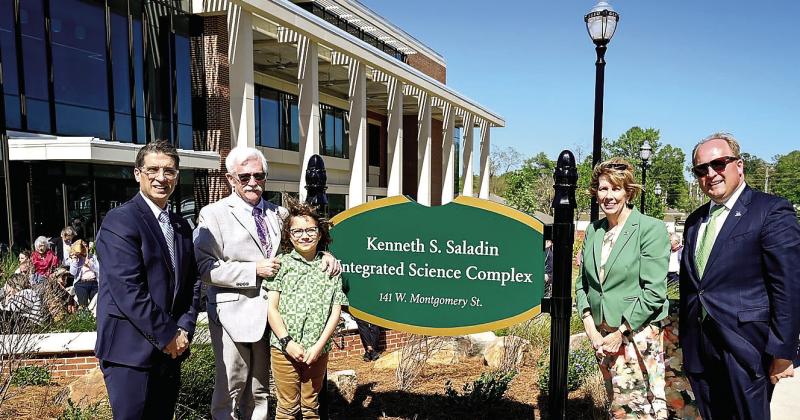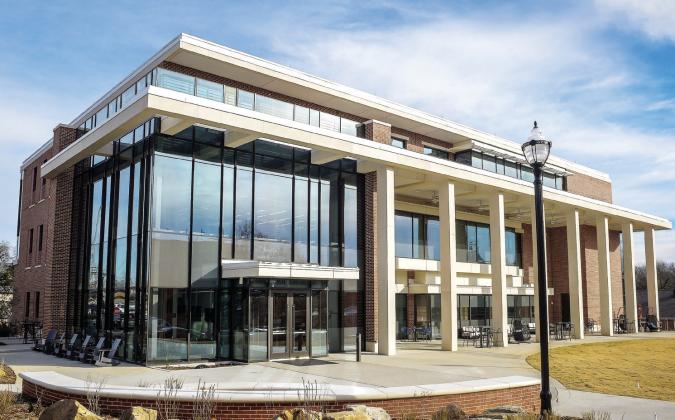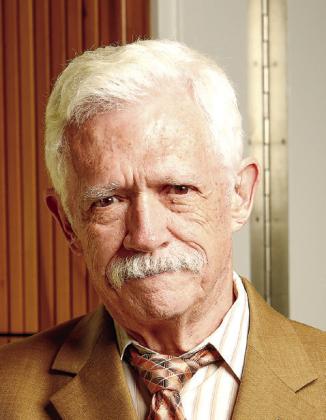The Integrated Science Complex at Georgia College & State University (GCSU) was unveiled as the Dr. Kenneth S. Saladin Integrated Science Complex April 12 on the building’s lawn at 141 W. Montgomery St. in Milledgeville.
Dr. Kenneth S. Saladin, professor emeritus of biology, has made a lasting impact on science and students at Georgia College.
“Naming the Integrated Science Center for Dr. Kenneth Saladin is a fitting and appropriate tribute to a person who provided and continues to provide extraordinary service and support to the university, spanning more than 40 years,” said Cathy Cox, GCSU president.
Saladin was an outstanding and dedicated educator at Georgia College. He began publishing a textbook in 1997 that’s now in its 10th edition and has become the single largest-selling textbook in the history of McGraw-Hill Education. He generously contributed royalties earned from his publishing successes that benefit the university and students in numerous ways.
This has made Saladin the university's largest philanthropic donor.
His first major gift was an endowment to the William Wall Museum of Natural History recognizing Saladin’s colleague and former department chair who created the museum.
He endowed the university’s Honors College, choosing to name it for his friend and former colleague, Dr. John E. Sallstrom. He also provided scholarships to support study abroad and research ventures for honor students.
“Dr. Saladin’s amazing generosity supports both undergraduate and graduate research within the department,” said Dr. Indiren Pillay, professor of biology and chair of the department of Biological and Environmental Sciences.
Saladin continues to be instrumental in the sciences at Georgia College.
More than a decade ago, he devised a pre-medical program where he mentored biology students interested in medicine. The Pre-Med Mentorship Program at Georgia College, through Saladin’s endowment of a chair position, ensured mentorship would endure following his retirement.
Students studying under Saladin and his successor, Dr. Ashok Hegde, have earned a 100% successful admissions rate to medical schools for more than 14 years.
More recently, Saladin has remained a faithful supporter of a variety of programs. He is especially dedicated to promoting biology and environmental science students, who engage in undergraduate research.
“This consistent means of support helps us purchase research supplies and instrumentation for students,” Pillay said, “as well as provide travel support for professional journal publications and conferences, so students can disseminate their work.”
The Integrated Science Complex officially opened in September 2021 and is a $22.1 million building with 43,000 sq. ft. of teaching and research labs for chemistry and biology.
Now bearing Saladin’s name, the science building has common Georgia College hallmarks, such as a rocking chair, front porch and ample brickwork. It also boasts modern architectural features, which include floor-to-ceiling windows and interior glass walls that put science on display.
The building was a necessity. Georgia College has seen a 107% increase in bio-science majors during the past 12 years. Space was cramped for labs, classes and faculty offices in the university’s aging Herty Hall, built in 1954, located across Montgomery Street.
In the next two years, Herty Hall will undergo extensive renovations with support from the Georgia General Assembly and University System of Georgia Board of Regents.
- Contributed by University Communications



